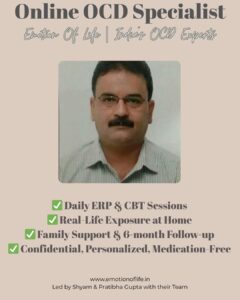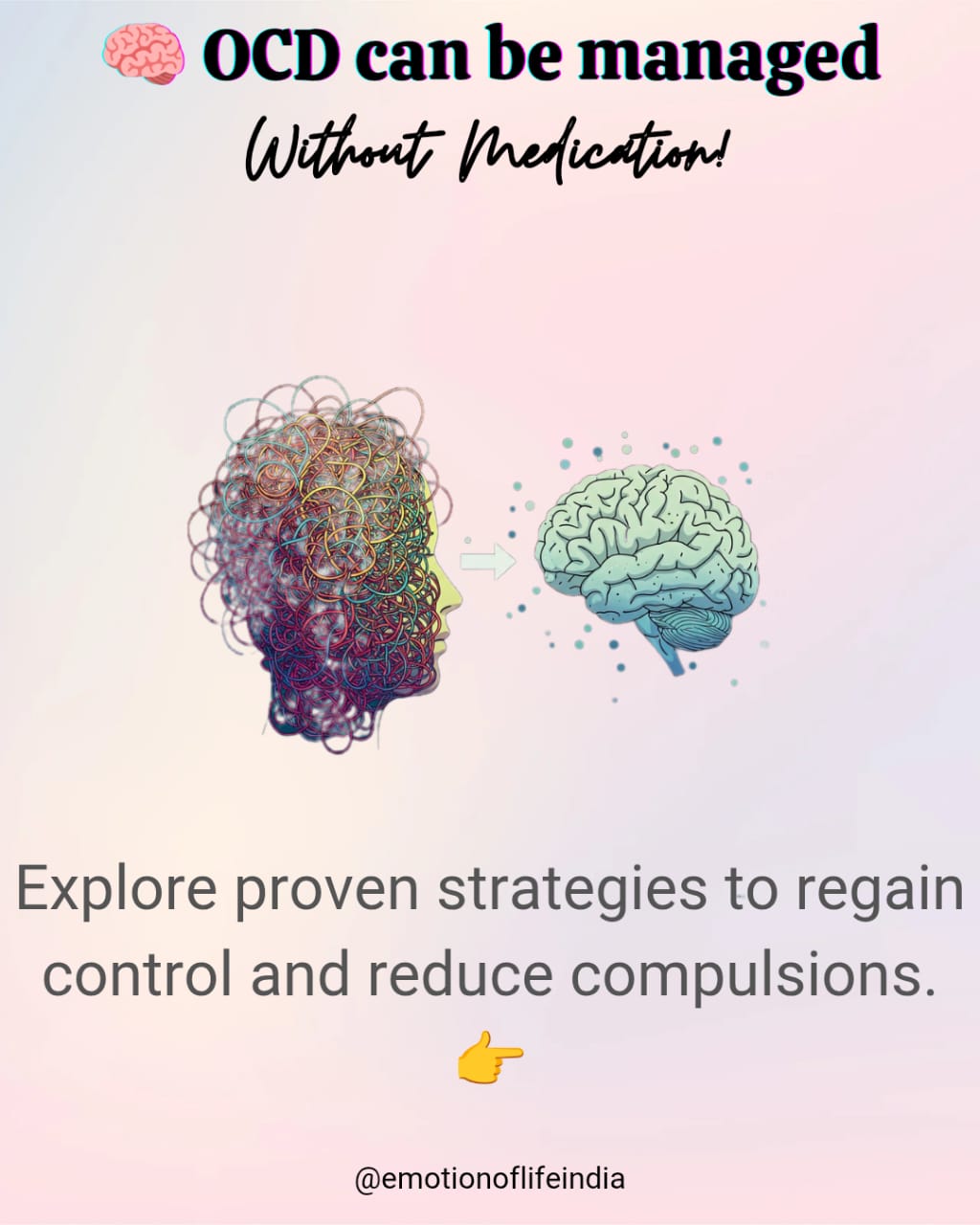Online OCD Specialists: Bridging Distance with Expertise for Lasting Recovery
In recent years, the field of mental health care has evolved dramatically with the integration of digital platforms and remote service delivery. Among the areas witnessing substantial progress is the treatment of Obsessive-Compulsive Disorder (OCD). Online OCD specialists, such as those from Emotion of Life, now offer structured, evidence-based interventions that rival traditional, in-person models—not just in convenience, but in effectiveness.
This shift reflects a broader change in how we define access to care. No longer limited by geography or logistical constraints, individuals struggling with OCD can now receive highly specialized treatment from certified professionals, including the expert team at Emotion of Life, customized to their unique symptom profile and life circumstances.
Understanding OCD Through a Functional Lens
OCD is not merely about repetitive behaviors or odd rituals. At its core, it’s a condition rooted in distressing, unwanted thoughts (obsessions) that compel an individual to engage in repetitive mental or physical actions (compulsions). These actions are not voluntary—they serve to neutralize anxiety or prevent imagined catastrophes, even when the individual understands the fears are irrational.
The resulting cycle—obsession, anxiety, compulsion, temporary relief, and recurrence—is not just exhausting but can be life-disrupting. It affects daily routines, relationships, academic or professional productivity, and emotional well-being.
OCD is best understood not only as a condition of thought but also as a pattern of learned responses reinforced over time. Modern psychological treatment, as implemented by Emotion of Life, focuses on interrupting this pattern through structured, behavioral and cognitive strategies.
Why the Online Model Works for OCD
The online format for OCD treatment is particularly well-suited for this condition for several reasons:
- Accessibility to Specialists
OCD is a nuanced condition with various subtypes—contamination, harm, checking, symmetry, religious, existential, and sexual intrusive thoughts, to name a few. General therapy may help with emotional support, but treating OCD requires a therapist trained specifically in approaches such as Exposure and Response Prevention (ERP) and Cognitive Behavioural Therapy (CBT). Platforms like Emotion of Life connect clients to niche specialists, regardless of location.
- Consistency and Frequency
Some of the most successful online recovery programs deliver therapy sessions daily, following a structured model over weeks or months. Emotion of Life’s daily-session format ensures consistency and therapeutic momentum, crucial for reprogramming thought-behavior patterns.
- Real-Time, Real-Life Integration
Many OCD triggers are embedded in the client’s home, work, or social environment. Online sessions allow therapists to guide exposure exercises within these real-life contexts rather than simulated office scenarios. Emotion of Life therapists tailor exposure tasks to your environment, increasing effectiveness.
- Privacy and Reduced Stigma
Seeking mental health support still carries stigma in many cultures. Being able to receive treatment from home provides a sense of privacy and autonomy that encourages individuals to reach out earlier—and stick with the process longer. Emotion of Life respects and supports this need for confidentiality and comfort In Online Mode Via Video call.
The Structure of Effective Online OCD Programs
An effective online OCD program isn’t just a sequence of video calls. It is a system with defined phases, goals, and feedback loops. Emotion of Life’s program is a prime example that include:
- Initial Assessment: This is the foundation of the treatment journey. In this phase, the therapist conducts a comprehensive evaluation of the client’s symptoms. This includes identifying the specific OCD subtype, measuring severity, mapping triggers, and understanding current coping mechanisms. It also helps the therapist build a therapeutic bond and set expectations for the process ahead.
- Personalized Planning: Based on the initial assessment, a custom recovery roadmap is created. This plan considers the client’s thought patterns, emotional responses, daily routine, and personality traits. It includes clear treatment goals and outlines how therapy will unfold step by step. Personalization ensures therapy aligns with the client’s lifestyle and values.
- Foundation Building: This phase focuses on preparing the client emotionally and mentally for the work ahead. Clients are educated about the OCD cycle, the science behind treatment, and what to expect during exposure work. Rapport is built here, and clients begin to feel more empowered as they understand the logic and effectiveness of the method.
- Targeted Therapy: Here, the main therapeutic work begins using ERP and CBT techniques. Clients gradually face their fears without relying on rituals, allowing anxiety to naturally decrease over time. The therapist guides exposures in a safe, supportive way, adjusting the difficulty to match the client’s comfort and progress.
- Monitoring & Adjustments: Throughout therapy, progress is monitored and closely tracked on day to day basis and monthly evaluation is conducted. The therapist assesses what’s working and where more support is needed, fine-tuning the approach as needed. This flexibility helps maintain momentum and ensures that therapy stays relevant to the client’s evolving needs.
- Family Involvement Family dynamics often play a major role in the OCD cycle. Educating loved ones helps reduce unintentional reinforcement of compulsions. Family members learn how to offer support without enabling rituals, and therapy may also address any tension or confusion within the household.
- Relapse Planning & Follow-Up: Effective relapse prevention is a core component of therapeutic journey, ensuring that individuals maintain their progress and continue to lead symptom-free lives. During the training process, clients are systematically exposed to situations that previously triggered their symptoms. This controlled exposure helps them develop resilience, confidence, and the necessary coping skills to navigate real-world challenges.
As part of the therapeutic journey, during relapse management phase we put clients back into those old triggering scenarios and situations in a guided and supportive manner, allowing them to practice and reinforce their newly learned strategies. By doing so, they build the mental and emotional strength required to overcome past vulnerabilities without reverting to old, maladaptive behaviors. This process also enhances their problem-solving skills, self-efficacy, and emotional regulation.
- Additionally in Emotion of Life, we provide structured weekly follow-up support for six months post-recovery and after relapse management to ensure that clients remain OCD-free. Regular check-ins, counseling sessions, and adaptive coping strategies help reinforce their progress and address any emerging challenges. This long-term support system empowers individuals to sustain their recovery and confidently navigate their daily lives without relapse.
Psychological Factors Addressed in OCD Recovery
OCD doesn’t develop in isolation. Most of the clients experience underlying emotional patterns such as guilt, regret, fear of failure, or a deep sense of dissatisfaction. These emotional states, though not always apparent, often maintain the OCD cycle.
Emotion of Life’s approach incorporates modules to:
- Develop emotional resilience
- Reframe self-critical thought patterns
- Strengthen self-worth and identity beyond the condition
This holistic understanding ensures that treatment goes beyond symptom control and fosters true personal growth.
Addressing the Idea of “Cure”
The notion of “curing” OCD is often seen as not curable in mental health field. While traditionally viewed as a chronic condition, Emotion of Life’s data-backed programs show that full remission—with no remaining compulsions or obsessive interference—is possible with the right intensity, duration, and therapeutic alignment.
However, this outcome depends on client commitment . Emotion of Life emphasizes collaborative recovery, where clients are active participants through:
- Regular attendance
- Completion of assigned tasks.
- Open communication / Ready and willing to share their day to day emotions and challenges
- Post-recovery maintenance / coming for weekly sessions. (6 months)
Emotion of Life ensures that its services are:
- Delivered by licensed OCD-trained professionals
- Transparent about methodology
- Guided by strict consent and data privacy policies
The Indian Context: Rising Need, Innovative Responses
In India, access to specialized OCD care remains limited. The emergence of structured online programs has begun to fill this gap.
Emotion of Life, under expert therapists like Shyam Gupta and Pratibha Gupta with their other Team Members, combines daily online sessions, family involvement, and customized plans. These programs reflect a shift toward science-backed, culturally sensitive, and medication-free mental health care.
Beyond symptom management, Emotion of Life focuses on rebuilding emotional resilience and social confidence, helping clients reclaim their life.
Final Thoughts: OCD Recovery and Cure Is Possible!
Recovery from OCD is not a switch—it’s a process. It demands time, commitment, and expert support. Emotion of Life’s online specialists are uniquely positioned to offer all three.
By expanding the boundaries of traditional therapy, Emotion of Life is redefining what mental health access looks like—helping people heal, grow, and thrive, no matter where they are.


